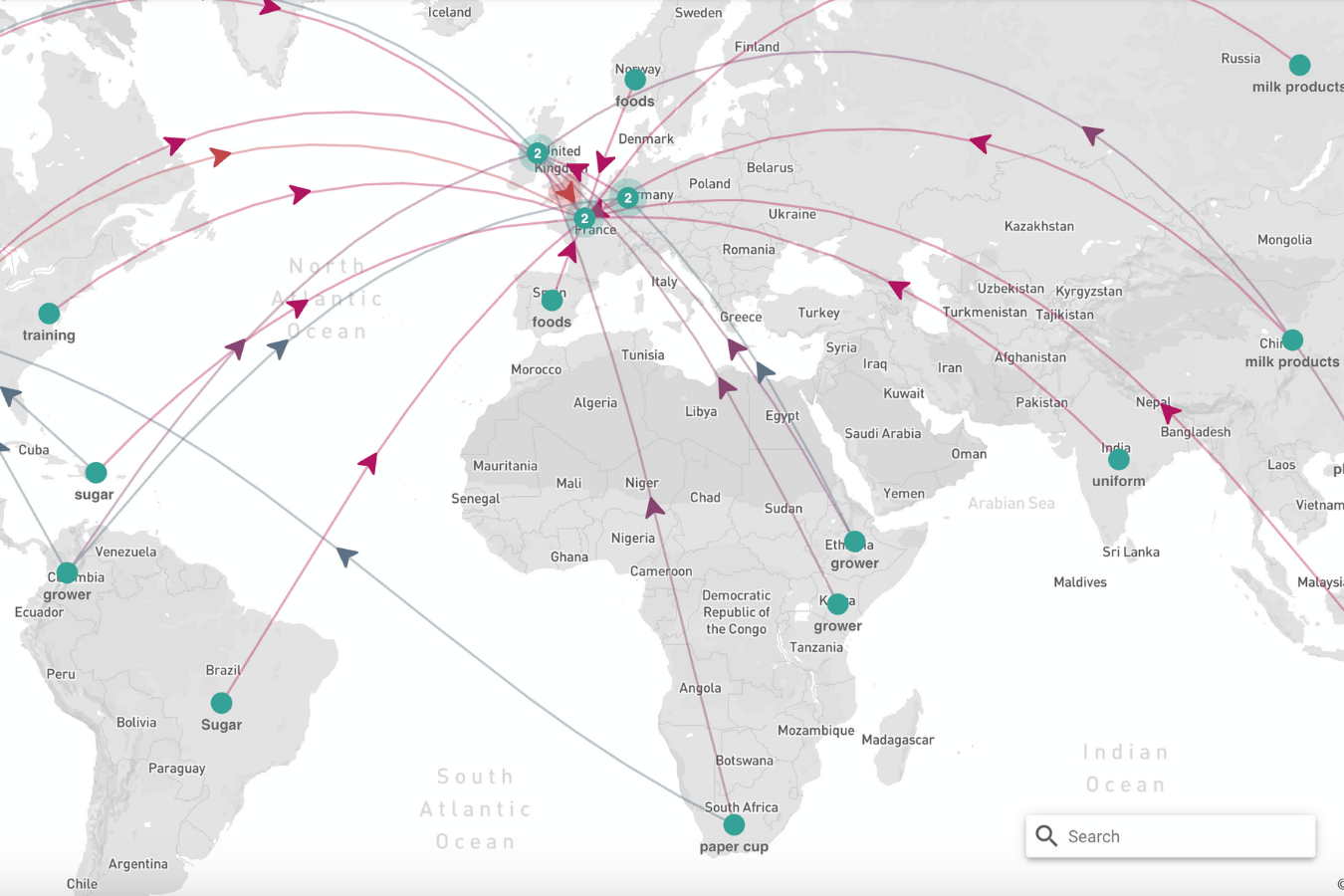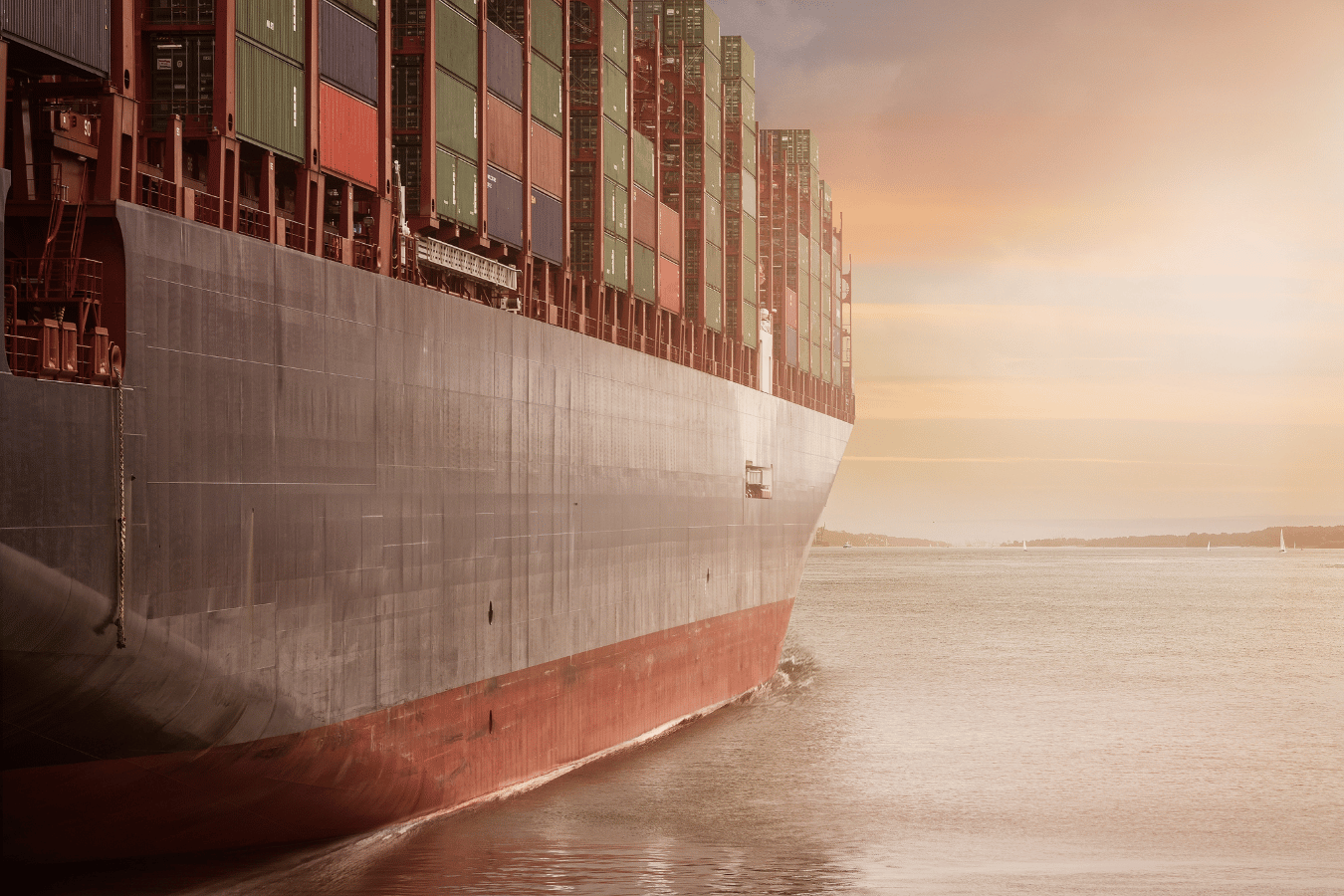90% of everything…
90% of everything we own and use, has at some point, spent time as cargo in a container ship, traveling through a vast network of ocean routes and ports that most of us know almost nothing about. Our economy relies on international trade, and international trade relies on ships.
/ Photo credit: Peter Menzel - Material World A Global Family Portrait: USA (2002)
Those items have also passed through the hands of many others, extracted from land and sea, shaped into a form ready for consumption, then packaged, delivered, bought, used, and discarded. These intricate supply chains of stuff, connect us to the livelihoods of others and environments across the planet, more intimately than ever before.
/ Image: A supply chain map for a London coffee shop via Sourcemap
“On ship-tracking websites, the waters are black with dots. Each dot is a ship; each ship is laden with boxes; each box is laden with goods. In postindustrial economies, we no longer produce but buy. We buy, so we must ship. Without shipping there would be no clothes, food, paper, or fuel. Without all those dots, the world would not work.”
/ Talk: Rose George - Inside the Secret Shipping Industry (2013)
Read her books HERE.
Not only are we blind to this gigantic maritime industry, but also to the environment that supports it. Covering 70% of the planet’s surface, the ocean is the lifeblood of Earth, driving weather, regulating temperature, and ultimately supporting all living organisms.
/ Photo credit: Anuar Patjane Floriuk - "Whale Whisperers"
Yet for all our reliance on the ocean, 95% of this realm remains unexplored. We know more about the surface of the Moon and Mars, than the ocean floor.
Listen to this awe-inspiring talk about the ocean, by marine biologists Tierney Thys and Sylvia Earle.
/Photo credit: A collage of plankton from research carried out by sailing research vessel Tara Ocean
The lack of knowledge is not standing in the way of “progress.” Long considered the traditional domain of shipping, fishing, and (since the 1960s) offshore oil and gas, the maritime industry landscape is undergoing a profound transition.
/ Photo: Offshore oil rigs, Vietnam
New industries include offshore wind, tidal and wave energy; oil and gas exploration and production in ultra-deep water and exceptionally harsh environments; offshore mariculture; seabed mining; deep sea water harvesting; OTEC power; marine tourism; and marine biotechnology.
/ Photo: An ocean-based Aquapod for farming fish
These industries may be of great benefit but are operating largely unregulated, in a barely managed ocean space.
Watch this talk by Kristina Gjerde about “Making law on the high seas."
/ Photo credit: Christian Steiness, Vattenfall Horns
It is time for us to reconnect with our oceans, our commons, and demand transparency and ethical management of this global seascape, above and below the water, for the benefit of both people and the planet.
A good place to start is at home - for eventually, all things return to the sea. Refuse, Reduce, Reuse, Recycle, ReTHINK.
/ Photo credit: David Doubilet, Papua new Guinea
shipping facts…
- Shipping is responsible for 3.5% - 4% of all climate change emissions.
- There are over 90,000 ocean-going cargo ships.
- They release 1 billion tons of CO2 each year and rising.
- Cargo ship Emma of Maersk burns 16 tons of fuel per hour.
- 15 of the largest ships pollute as much nitrogen and sulphur oxide as all the cars in the world.
Beyond fossil fuel emissions, shipping has other detrimental impacts on the environment:
COLLISIONS with vessels can affect all species of whales and often go unnoticed and unreported.
SOUND POLLUTION from shipping travels long distances interfering with many marine species’ abilities to communicate, feed, and locate themselves.
/ Film: Sonic Sea
SHIPPING ACCIDENTS, even in the age of precision navigation, often occur at sea. As the size of ships increases so does the scale of the impact on the environment should the ship fall into disaster.
This is exacerbated by the growing fleet of shadow tankers that transport sanctioned oil with little regard for industry regulations.
/ Photo: The motor vessel Hyundai Fortune burning in the Gulf of Aden
BALLAST WATER discharged between foreign ports contains non-native matter that can cause extensive damage to local aquatic ecosystems.
OIL SPILLS are considered a major ecological threat due to the large amount of oil spilled per accident and the fact that major sea traffic routes are close to Large Marine Ecosystems.
/ Photo: MV Wakashio runs aground of the coast of Mauritius
SHIP BREAKING in 2013 - 1,213 ships were broken down, containing tens of thousands of tons of hazardous waste materials. It is one of the most dangerous jobs in the world. At Alang, in India, 40,000 migrant workers tear apart, literally by hand, half of the world’s discarded ships.
/ Film: Shipbreakers
shipping films…
“To find out more about this huge, invisible network, I accompanied a group of architects and designers called the Unknown Fields Division for a rare voyage on a container ship between Korea and China. The aim of the trip was to follow the supply chain back to some of the remotest parts of China and the source of our consumer goods — and what we saw as we traveled through mega-ports and across oceans looked closer to science fiction than reality.” - Milos Bicanski
“Consumed is a cinematic journey through the landscapes, mines, factories, and shipyards of Chinese production. Blurring the lines between documentary and fiction, a single worker narrates his story to the rhythm of industrial machinery. The film reveals the hidden world behind our everyday objects, re-framing complex supply chains that feed global desires.”
/ Film: Consumed - Richard John Seymour
“Retail giants have outsourced the manufacturing of consumer products for decades. This has driven significant growth in fossil-fueled maritime shipping. Backed by Big Oil, fossil-fueled maritime shipping is so cheap that it helps justify corporations’ production of goods overseas. The world’s shipping fleet has quadrupled in size since the 1980s to keep up with demand.”
/ Report: Shady Ships - Ship it Zero
“FREIGHTENED reveals in an audacious investigation the mechanics and perils of cargo shipping; an all-but-visible industry that relentlessly supplies 7 billion humans and holds the key to our economy, our environment, and the very model of our civilisation.”
/ Film: Freightened: The Real Price of Shipping.
(available to stream via most services)











